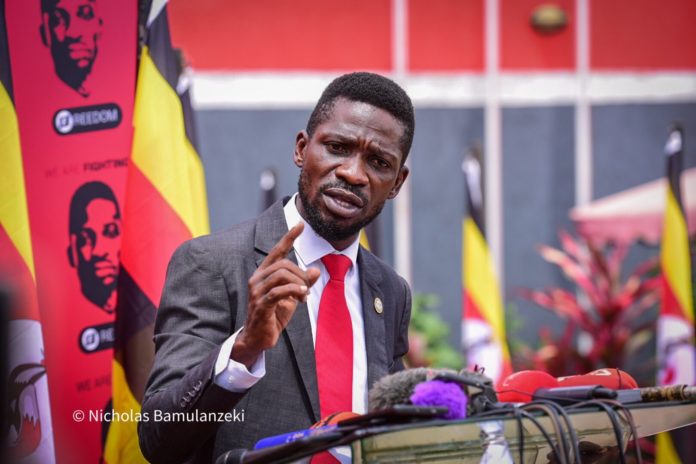Uganda’s youthful musician turned opposition politician, Robert Kyagulanyi has ended his long shot suit aiming to overturn President Yoweri Museveni’s disputed victory in the January 14 election, clearing the way for the long-serving leader to extend his 35-year rule.
Kyagulanyi, known by his stage name Bobi Wine blamed judges on the 9-man panel of bias and said he would now refer the matter to the court of “public opinion” setting the stage for a possible repeat of raucous street protests.
“We have decided to withdraw our petition from court because it’s clear that the courts are not independent, these people are working for Mr. Museveni,” he told a cheering crowd of supporters in the yard of his party offices, in the slums of Kamwokya.
Wine in his application to withdraw the petition listed several reasons including court rejecting amendment to his petition, arrest of his key witnesses, and alleged bias in the court towards Museveni, who has ruled Uganda since 1986.
The decision marked a tantalizing end for the suit, which was poised to be a stern test for judicial independence in this east African nation. Across Africa, fewer courts have overturned elections although Kenya’s Supreme Court came up with a stunning ruling four years ago, reversing the 2017 election win of President Uhuru Kenyatta.
Oscar Kihika, one of Museveni’s lawyers said that Wine would have to pay all the expenses his client had spent on the petition.
Last month, Wine through his lawyers, filed the petition seeking to nullify the election that saw Museveni win a sixth term with 58 percent of the votes and Wine just 35%.
Museveni, the electoral commission, and the Attorney-General filed their 185 affidavits in response to the 53 grounds that the National Unity Platform legal team had raised to prove that the election was rigged, and wasn’t free and fair.
Wine continues to call upon Ugandans to reject the results of the controversial election in which dozens of opposition party members and supporters were killed and arrested. The elections were further plagued with voter intimidation and heavy military deployment in several districts that were opposition strongholds. Wine was put under de facto house arrest for 12 days after the election and later released on court order.
Election monitoring was further complicated by the denial of accreditation to European Union observers and members of the United States observer mission.
Internet access was blocked across the country on the eve of elections and restored on Jan. 18 however access to social media sites like Facebook remains restricted and can only be accessed using Virtual Private Networks.
“A democratic playing field for free and fair elections was worryingly absent during elections,” said Oryem Nyeko, Africa researcher at Human Rights Watch. “The Ugandan government should take concrete steps to improve respect for human rights for all and remove all remaining restrictions.”
But Museveni continues to laud the elections as the most “free and fair” poll Uganda has ever had. “This was one of the most cheating free elections since 1962,” he said in January just after election results were certified by the National Electoral Commission. “I thank the 57% of Uganda’s 18 million registered voters that participated in the election.”

